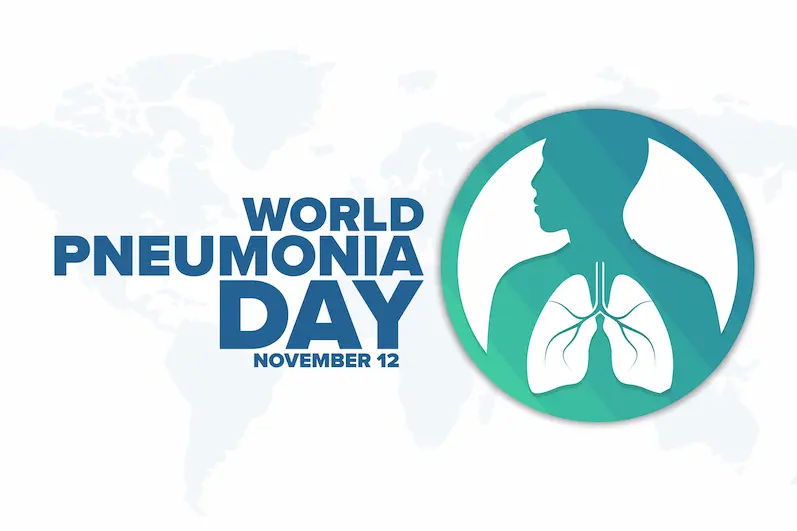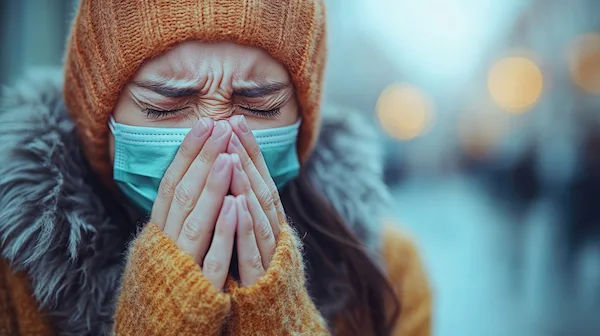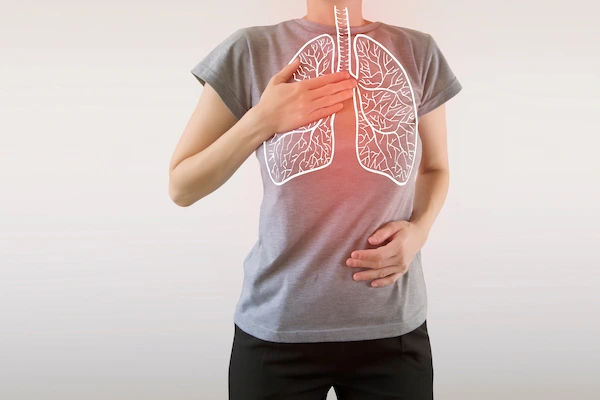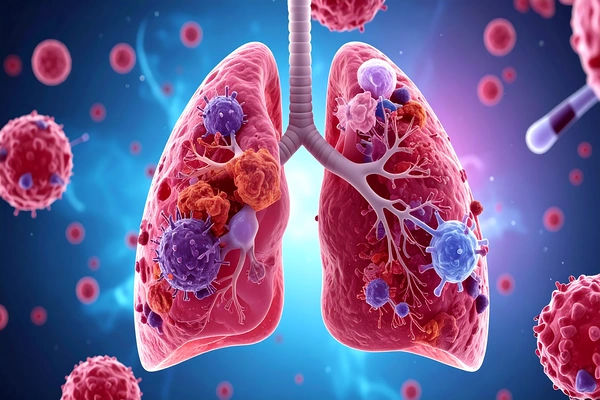Guide to Preventing Pneumonia In Cold Weather
Learn effective tips to prevent pneumonia during cold weather. Discover how vaccinations, hygiene, nutrition, and lifestyle habits can help reduce your risk.

Written by Dr. Md Yusuf Shareef
Reviewed by Dr. Shaik Abdul Kalam MD (Physician)
Last updated on 13th Jan, 2026
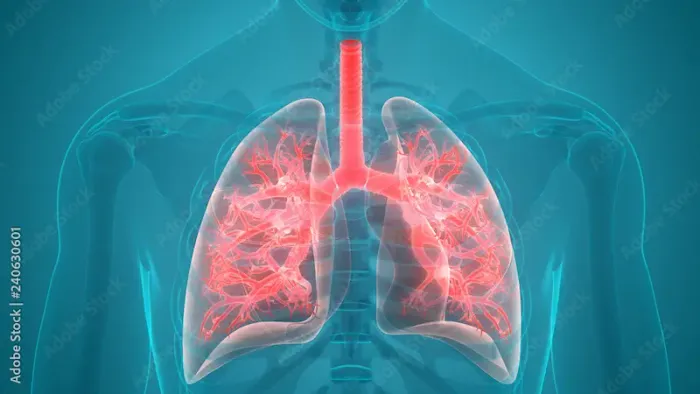
Introduction
As the mercury drops and we retreat indoors, the season of cozy sweaters and hot beverages also brings a less welcome guest: an increased risk of respiratory illnesses, notably pneumonia. This serious lung infection can develop from a common cold or flu, especially when the weather turns cold. But fear not—this doesn't mean you're destined to get sick. By understanding the risks and implementing strategic defenses, you can significantly reduce your chances of falling ill. This comprehensive guide will walk you through the science behind the seasonal spike in pneumonia cases and provide actionable, evidence-based steps to protect yourself and your loved ones throughout the winter months. We'll cover everything from essential vaccinations and hygiene to lifestyle tweaks that fortify your body's natural resilience.
Why Does Cold Weather Increase Pneumonia Risk?
The link between cold weather and respiratory disease isn't just an old wives' tale; it's grounded in science. Several factors converge during winter to create a perfect storm for pathogens like the bacteria and viruses that cause pneumonia.
The Indoor Crowding Effect
Colder temperatures drive people indoors into closer proximity with one another. Homes, offices, malls, and public transport become hubs where germs can easily spread through coughs, sneezes, and contaminated surfaces. This increased contact amplifies the transmission of influenza and other viruses that are primary precursors to pneumonia.
How Cold Air Affects Your Respiratory Defenses
Breathing in cold, dry air can actually impair your lungs' first line of defense. The tiny hairs (cilia) that line your airways and help sweep pathogens and irritants out of your lungs become less effective in low temperatures. This slowdown allows viruses and bacteria to linger and penetrate deeper into the respiratory system, potentially leading to a lower respiratory tract infection like pneumonia.
Low Humidity and Your Mucus Membranes
Winter air holds less moisture, both outdoors and indoors (due to heating systems). This dry air can dehydrate the protective mucus layer in your nasal passages and throat. This mucus is a sticky trap for germs; when it dries out, it becomes less effective, making it easier for invaders to reach your lungs.
Consult a Pulmonologist for the best advice
Know Your Enemy: Understanding Pneumonia
To prevent it, you must understand it. Pneumonia is an infection that inflames the air sacs in one or both lungs. The sacs may fill with fluid or pus, causing a phlegmy cough, fever, chills, and difficulty breathing.
Bacterial vs. Viral Pneumonia: What’s the Difference?
• Bacterial Pneumonia: The most common cause in adults is Streptococcus pneumoniae. It often comes on suddenly and can be treated with antibiotics.
• Viral Pneumonia: Frequently caused by respiratory viruses like influenza, RSV, or even SARS-CoV-2. Antibiotics are ineffective, and treatment focuses on managing symptoms and supporting the immune system. A key pneumonia prevention strategy is avoiding the viral infections that can lead to it.
Common Symptoms You Should Never Ignore
Recognising symptoms early is crucial for prompt treatment. Be vigilant for:
• A cough that produces green, yellow, or bloody mucus
• High fever, sweating, and shaking chills
• Shortness of breath or rapid, shallow breathing
• Sharp or stabbing chest pain that worsens when you breathe deeply or cough
• Unusual fatigue, loss of appetite, and confusion (especially in seniors)
If your condition does not improve after trying OTC methods for a few days, consult a doctor online with Apollo24|7 for further evaluation.
Your First Line of Defense: Proactive Prevention Strategies
Prevention is always better than cure. A multi-layered approach is your best bet for staying healthy.
The Non-Negotiable: Vaccination
Vaccination is the single most effective way to prevent pneumonia and its severe complications.
Pneumococcal Vaccines: Who Needs Them?
These vaccines protect against the most common bacterial cause. They are highly recommended for adults over 65, young children, and those with chronic health conditions (e.g., asthma, diabetes, heart disease) or weakened immune systems.
The Crucial Role of the Annual Flu Shot
Since the flu is a leading cause of viral pneumonia, getting your annual influenza vaccination is a critical preventive step. It stops the initial infection that can pave the way for a secondary bacterial pneumonia.
Fortify Your Body’s Natural Defenses
A robust immune system is your personal bodyguard.
Nutrition: Eating for a Strong Immune System
Focus on a whole-foods diet rich in vitamins and antioxidants. Key players include:
• Vitamin C: Found in citrus fruits, bell peppers, and broccoli.
• Vitamin D: Crucial for immune function. With less sunlight in winter, consider a supplement after consulting your doctor. Apollo24|7 offers a convenient home collection for tests like vitamin D to check your levels.
• Zinc: Found in legumes, nuts, seeds, and meat, it's vital for immune cell development.
The Power of Hydration and Rest
Adequate fluids keep your mucus thin and easy to expel. Aim for 8 glasses of water daily. Furthermore, prioritise 7-8 hours of quality sleep per night. Sleep is when your body repairs itself and produces infection-fighting cells.
Smart Hygiene Habits to Break the Chain of Infection
• Wash Hands Frequently: Use soap and water for at least 20 seconds, especially after being in public.
• Use Hand Sanitiser: When soap isn't available, use an alcohol-based sanitiser.
• Don't Touch Your Face: This prevents germs on your hands from entering your body via your eyes, nose, or mouth.
• Disinfect Surfaces: Regularly clean high-touch areas like doorknobs, light switches, and phones.
Lifestyle Adjustments for the Cold Months
Small changes in your daily routine can make a big difference in your pulmonary health.
Dressing Smart: Layering and Protecting Your Airways
Wear a scarf or a cold-weather mask over your nose and mouth when outside in frigid air. This helps warm and humidify the air before it enters your lungs, reducing the shock to your respiratory system.
Optimising Your Indoor Environment: Humidifiers and Ventilation
Using a cool-mist humidifier in your bedroom can combat dry air, keeping your respiratory membranes moist and functional. Additionally, don't seal yourself in completely. Crack a window occasionally to allow fresh air to circulate and dilute any airborne contaminants indoors.
High-Risk Groups: Extra Precautions Are Essential
While anyone can get pneumonia, certain groups are more vulnerable and must be extra vigilant:
• Adults aged 65 and older
• Children under 2 years old
• People with chronic diseases (e.g., COPD, asthma, heart disease, diabetes)
• Individuals with weakened immune systems (e.g., from HIV, chemotherapy, or long-term steroid use)
• Smokers, as smoking damages the lungs' natural defenses.
If you or a loved one falls into a high-risk category, be hyper-aware of symptoms and seek medical advice at the first sign of illness.
When to Seek Medical Help: Recognizing the Red Flags
It's vital to know when home care isn't enough. Seek immediate medical attention if you or someone you're caring for experiences:
• Difficulty breathing or severe shortness of breath
• A fever of 102°F (39°C) or higher that persists
• Persistent chest pain
• A cough that is worsening or producing pus
• Confusion or changes in mental awareness (in older adults)
If symptoms persist beyond two weeks, consult a doctor online with Apollo24|7 for further evaluation and to discuss if a chest X-ray or other tests are needed.
Conclusion
Navigating the cold months without succumbing to pneumonia is entirely possible with knowledge and proactive measures. This guide has equipped you with an understanding of why winter poses a threat and a practical, multi-layered strategy to fight back. From the essential step of vaccination to the daily habits of handwashing, smart nutrition, and protecting your airways, you have a powerful toolkit at your disposal. Remember, your health is your greatest wealth. By taking these precautions, you can confidently enjoy the beauty of the season while keeping your respiratory system safe and sound. Stay warm, stay informed, and stay healthy.
Consult a Pulmonologist for the best advice
Consult a Pulmonologist for the best advice

Dr Abhishek Verma
Pulmonology Respiratory Medicine Specialist
5 Years • MD (Respiratory Medicine), PDCC (Interventional Pulmonology) Alumni SGPGIMS & KGMU Lucknow
Lucknow
Apollomedics Super Speciality Hospital, Lucknow
(50+ Patients)

Dr. Rajkumar Kulasekaran
Pulmonology Respiratory Medicine Specialist
10 Years • DNB Resp. DISEASES, FCCP
Chennai
Apollo Speciality Hospitals OMR, Chennai
(75+ Patients)

Dr Rakesh Bilagi
Pulmonology Respiratory Medicine Specialist
10 Years • MBBS MD PULMONOLOGIST
Bengaluru
Apollo Clinic, JP nagar, Bengaluru

Dr. K R R Umamahesh Reddy
Pulmonology Respiratory Medicine Specialist
16 Years • MBBS, MD Pul Med.
Nellore
Apollo Speciality Hospitals, Nellore
(25+ Patients)

Dr. Raju Pampana
Pulmonology Respiratory Medicine Specialist
10 Years • MBBS, MD
Kakinada
Apollo Hospitals Surya Rao Peta, Kakinada
Consult a Pulmonologist for the best advice

Dr Abhishek Verma
Pulmonology Respiratory Medicine Specialist
5 Years • MD (Respiratory Medicine), PDCC (Interventional Pulmonology) Alumni SGPGIMS & KGMU Lucknow
Lucknow
Apollomedics Super Speciality Hospital, Lucknow
(50+ Patients)

Dr. Rajkumar Kulasekaran
Pulmonology Respiratory Medicine Specialist
10 Years • DNB Resp. DISEASES, FCCP
Chennai
Apollo Speciality Hospitals OMR, Chennai
(75+ Patients)

Dr Rakesh Bilagi
Pulmonology Respiratory Medicine Specialist
10 Years • MBBS MD PULMONOLOGIST
Bengaluru
Apollo Clinic, JP nagar, Bengaluru

Dr. K R R Umamahesh Reddy
Pulmonology Respiratory Medicine Specialist
16 Years • MBBS, MD Pul Med.
Nellore
Apollo Speciality Hospitals, Nellore
(25+ Patients)

Dr. Raju Pampana
Pulmonology Respiratory Medicine Specialist
10 Years • MBBS, MD
Kakinada
Apollo Hospitals Surya Rao Peta, Kakinada
More articles from Pneumonia
Frequently Asked Questions
1. Can you really 'catch pneumonia' from being cold and wet?
Not directly. The germs (bacteria or viruses) cause the infection. However, being cold and wet can stress your body and weaken your immune response, making it easier for those germs to take hold if you're exposed to them.
2. What is 'walking pneumonia'?
Walking pneumonia is an informal term for a mild case of pneumonia, often caused by a bacterium called Mycoplasma pneumoniae. Symptoms are usually mild enough that you can still 'walk around' and perform daily activities, but it still requires medical attention.
3. How long does it take to recover from pneumonia?
Recovery time varies. Younger, healthier people might feel better in 1-2 weeks. For older adults or those with underlying conditions, it can take a month or longer to regain full strength and for chest discomfort to fully subside.
4. Are there any effective home remedies for pneumonia recovery?
While medical treatment is essential, supportive home care can aid pneumonia recovery. This includes getting plenty of rest, staying well-hydrated with water and broth, using a humidifier, and avoiding smoke or pollutants. These measures help your body fight the infection.
5. Is pneumonia contagious?
Yes, the germs that cause pneumonia can be contagious. They can spread through airborne droplets from a cough or sneeze. However, whether the exposed person develops pneumonia, a milder illness, or nothing at all depends on their own health and immune status.
